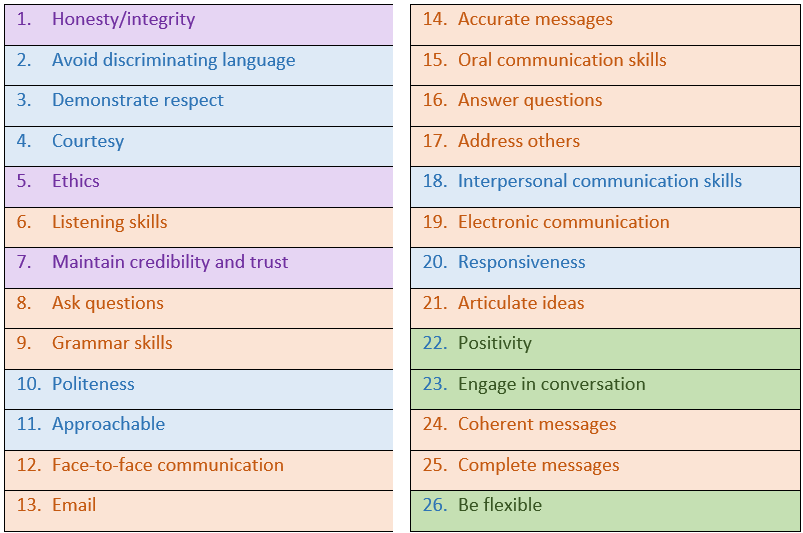
If you are an employer or an employee and are seeking to recruit someone new, what would you list as the top 10 types of communication skill you’d be looking for?
I suspect that if everyone’s responses were pooled, there would be a vast array of different answers. This is what a US study[1] found when they researched the area. Their list of communication skill items – generated initially from published studies – resulted in a very long list which they asked 260 employers from a range of sectors to evaluate.
The employers judged the items in two ways: (a) whether they regarded the item as a communication skill, and (b) the level of proficiency they wanted in that item when recruiting. 187 items were judged to be communications skills (according to at least two thirds of the employers) and the researchers list them in order of required level of proficiency. I’ve reproduced the top 26 in the table below.

When I saw this top 26 list, I was both interested in and surprised by the range of items it included.
Many were clearly about communication (shown in brown), albeit covering various aspects, including mode (e.g. email, face-to-face communication), traditional language skills (e.g. grammar skills, oral communication skills), and clarity of meaning content (e.g. coherent messages, complete messages).
Others were very much about people skills (shown in blue), including respectful relations (e.g. demonstrate respect, courtesy) and openness to other people (e.g. approachable, responsiveness).
Yet others were fuzzier in terms of categorization (shown in green), seeming to be more about interactional attitude than communication skills per se (e.g. engage in conversation, positivity, and be flexible).
Perhaps most surprising was the inclusion of items relating to integrity, ethics and trust (shown in purple).
All these findings raise two fundamental questions:
- Are people skills communication skills?
- Is integrity (and related elements) a communication skill?
People skills and communication skills
People skills are frequently seen as separate from communication. That was the case, for example, in a recent a research-based policy report published by the UK Department of Education which examined current and future skills needs[2]. They identified five sets of transferable skills, two of which were Communication skills and People skills; in other words, the two were treated separately. (See our GPC Insight on this.)
In fact, the two are very closely intertwined, and a vast body of theory and empirical research (including the responses from the US employers in this study) attests to this. The interconnection is particularly obvious in situations of cultural diversity, where communication patterns and preferences can be different. For example, differences in preferred styles of communication can easily lead to negative judgements and deteriorating relationships. So, it’s very important to understand how communication affects the management of rapport and relationships and acquire strategies for handling it more successfully.
- If you’d like to learn more about this, ask us about a guest talk or masterclass session. Email GPC or Helen directly.
- To learn more about ways of building rapport in global contexts and to access a wide range of case studies, activities and tools on the topic, see our 2022 book Global Fitness for Global People: How to manage and leverage cultural diversity at work.
Integrity and communication skills
Ethics and integrity are not usually included at all in lists of communication skills, yet in this US study they were listed in the top ten three times. In fact, honesty/integrity achieved top (number one) position in terms of importance to employers. But is this a communication skill?
About one third to one quarter of the respondents felt these three items (honesty/integrity, ethics, maintain credibility and trust) were not a communication skill, but two-thirds to three quarters responded that they are. Perhaps this relates to growing concerns over fake news, where the link between communication and honesty/credibility comes clearly to the fore. In situations of cultural diversity, where there can be differences of viewpoints as to what counts as ethical or unethical, handling the communication among the people concerned can be particularly challenging. In fact, in unfamiliar contexts it is often not easy to decide what is ethical or unethical, let alone how to handle it.
- If you’d like to learn more about this, ask us about a guest talk or masterclass session. Email GPC or Helen directly.
- To learn more about handling ethical challenges and maintaining integrity in global contexts, and to access a wide range of case studies, activities and tools on the topic, see our 2022 book Global Fitness for Global People: How to manage and leverage cultural diversity at work.
Concluding comments
This study only obtained responses from US employers. It’s quite possible – in fact, likely – that the list of top 26 communication skills most required by employers would be different if employers from different regions of the world were surveyed.
However, I think the key message of this study is that communication skills are fundamental to virtually all aspects of life. They cannot – and should not – be packaged off into a box and treated completely separately. Communication plays a massive role in the building (or undermining) of interpersonal relations, and this in turn is linked with honesty and trust. If someone deliberately lies to us, that in turn will affect our relationship with that person, and we need to find suitable ways of communicating our viewpoint to the person(s) concerned.
All of these challenges can be exacerbated by situations of cultural diversity. To learn more about this whole area, see our book, Global Fitness for Global People: How to manage and leverage cultural diversity at work, which is packed full of case studies, reflection activities, and developmental tools, and has a particular focus on relationship management and global rapport. If you’d like a 15% discount code from the publishers for this book (code valid until 30 September 2022), visit our website page. You’ll also be able to read about all our other publications!
Professor Helen Spencer-Oatey, Managing Director
References
[1] Coffelt, T. A., Cosgrove, S., & Vance, B. (2022). Measuring business and professional communication skills. Business and Professional Communication Quarterly, 85(2), 161–191.
[2] https://www.gov.uk/government/publications/understanding-current-and-future-skills-needs

